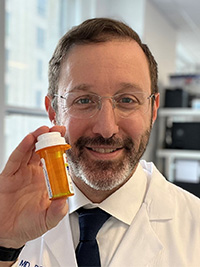The onset of menopause ushers in several changes for women, including higher rates of heart disease, stroke, and osteoporosis. Physicians at NewYork-Presbyterian/

Dr. Zev Williams is the principal investigator of the VIBRANT trial.
“A lot of us think that menopause is a given and it’s just part of life. The truth is, across the entire animal kingdom, menopause is by far the very, very rare exception,” says Zev Williams, MD, PhD, Chief of the Division of Reproductive Endocrinology and Infertility at NewYork-Presbyterian/
VIBRANT aims to evaluate the use of a low dose of the mTOR inhibitor rapamycin as a way to slow down the release of eggs from women’s ovarian reserve, thereby slowing ovarian aging. The trial will include 50 healthy women between ages 38 and 45 years who have regular menstrual periods but are not interested in conceiving. The participants will be randomized to receive either weekly oral rapamycin or placebo, with both the participants and investigators blinded to the assignment.
This is the first time that rapamycin, which is already approved to prevent organ rejection in patients receiving renal transplants, will be evaluated in humans for the purpose of slowing ovarian aging. However, the seeds of this trial were planted several years ago when Dr. Williams and colleagues discovered that the use of rapamycin not only restored normal ovarian function in mice with premature ovarian failure but also extended the reproductive lifespan for normal mice. Since then, it has been confirmed that rapamycin can extend the lifespan of the ovaries in mice.
“A lot of us think that menopause is a given and it’s just part of life. The truth is, across the entire animal kingdom, menopause is by far the very, very rare exception.” — Dr. Zev Williams
Normally menopause begins when the ovaries are depleted of all eggs. While women only have one egg that matures and is released during ovulation each menstrual cycle, dozens of others go through atresia and die off. Rapamycin appears to slow down the number of eggs that leave the resting pool each cycle, allowing the overall number of eggs to last longer and delay menopause. “It’s almost as if you have a sink full of water and you’re slowing down how fast the water is going down the drain,” Dr. Williams explains. “Menopause occurs when there’s no more water in the sink.”
Why are researchers interested in the idea of delaying menopause? Dr. Williams says delaying menopause, and the associated increase in cardiovascular disease and dementia, has the potential to extend a woman’s overall number of healthy years and lifespan.
“It’s almost as if you have a sink full of water and you’re slowing down how fast the water is going down the drain. Menopause occurs when there’s no more water in the sink.” — Dr. Zev Williams

Trial participants will receive either rapamycin capsules or placebo capsules once weekly for three months.
Rapamycin also has potential to slow down aging in general, beyond its role in ovarian functioning, Dr. Williams says. The difficulty in conducting aging research is that it can take decades to evaluate interventions in a prospective, randomized, placebo-controlled trial and observe differences in longevity. “In contrast, the field of reproductive medicine has developed a number of tools that allow us to quite accurately measure ovarian aging over the span of just a couple of years,” he says.
The VIBRANT trial is a pilot study that will evaluate a 5-mg per week dose of rapamycin, compared with placebo. Study participants will receive the medication for three months and then be followed for an additional nine months. During that time, researchers will use transvaginal ultrasound to measure ovarian reserve and blood tests to assess levels of anti-müllerian hormone, estradiol, follicle stimulating hormone, and klotho. Participants will be monitored for adverse events, though Dr. Williams says studies have demonstrated that the medication is well-tolerated.
The study, which began enrollment in May, had more than 100 people apply on the first day. Dr. Williams says the research team will do a careful screening to ensure they enroll patients who are able to remain engaged throughout the one-year study period. The trial was deliberately designed as a small pilot study but if the results are encouraging, the researchers plan to expand it to a larger, multicenter trial.
“The opportunity to have a relatively simple, low-cost intervention that can actually improve quality of life and extend lifespan, is just tremendous. I think all of us are really excited to see if this can do it or not,” Dr. Williams says.




